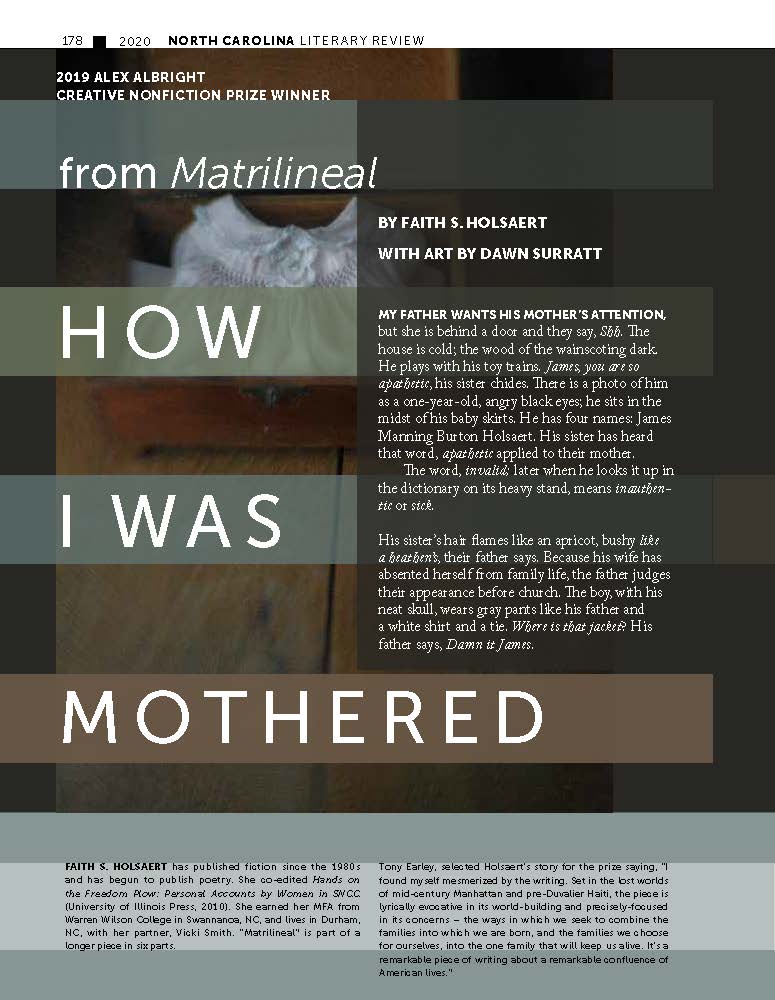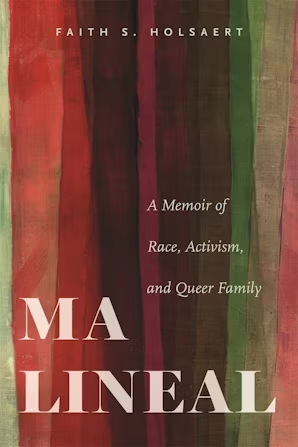by Lyra Thomas, Managing Editor

The first six months as Managing Editor for NCLR have flown by. Some days were longer than others – particularly, after my injury in September that had me in and out of the ER – but I digress. There is so much to be excited about every day with NCLR. Over this time I have worked with our many brilliant artists and authors, learned more about North Carolina’s rich tradition of striking poetry and prose, formatted pages in InDesign, and – my favorite – worked with our talented and hard-working interns – the true backbone of NCLR. For these opportunities and more, I am especially grateful.
As a poet, the writing contest I have been looking forward to the most is the James Applewhite Poetry Prize; however, I am currently inspired by the Alex Albright Creative Nonfiction Prize, open now for submissions (deadline March 1st).
It makes sense that NCLR named our nonfiction competition after its founder, an avid practitioner and afficionado of creative nonfiction. In 2002, during an interview with Tar River Poetry’s long-time editor Peter Makuck, Alex spoke on the importance of making creative nonfiction accessible: “I wanted text that would engage a reader in a nonacademic way, but it would treat subject matter as seriously as any academic would.” This criterion certainly applies to the first winner of the Albright Prize, Zackary Vernon’s “Boone Summer: Adventures of a Bad Environmentalist,” about which Albright noted in the 25th anniversary issue: “Through the lens of personal experience, he explores cultural, environmental, and regional subjects that make it an important addition to our state’s tradition of excellence in nonfiction writing.”

Over the years, we have published the winning essays and several finalists from this contest on a variety of subjects. In the NCLR Online Winter 2024 issue, ’23 winner Laura Hope-Gill electrified readers with her moving memoir essay about her disability journey in “The Weight of Light.” Steve Mitchell wrote about consciousness and space in his 2022 winner, “Ultimate Trip.” The 2019 winner, published in NCLR Online 2020, “How I Was Mothered,” Faith Holsaert reminisces about growing up with two mothers – one Jewish and one African American – in the mid 1900s. Her “Best of the Net” finalist essay expanded into her 2024 memoir, Ma Lineal (Wayne State University Press), which explores her experiences during the civil rights era. During the Albright Creative Nonfiction virtual reading in 2022, Holsaert reflected on this process, stating: “My memoir really is based on the idea that how I was mothered gave birth to the person I became.”

A professor once told me, “Everyone can write; however, everyone cannot write well.” While this may be true, it often-times can leave writers who can write well filled with fear and – every writer’s best friend – impostor syndrome. First coined in Vogue circa 1982, “impostor syndrome” plagues many writers and creatives. It may be why many of us fail to submit our work to contests or even during a standard open reading period. It’s important to remember that writing contests are, in fact, valuable to your writing career.
NCLR’s Editor, Margaret Bauer, reflects on her experience submitting to writing contests also, saying: “There are certain contests I submit to every year, and I’ve yet to win one, but I’ve been a finalist a few times, and one time my essay submitted to the Missouri Review’s renowned Jeffrey E. Smith Editors’ Prize contest was selected as a finalist and published in their online prose anthology Blast.”
If you get nervous submitting your work due to a fear of rejection, remember that even award-winning writers get rejected from major competitions sometimes. If you never try, you will never know. To submit your work is to be noticed – it can truly elevate your presence in the competitive world of literature, and making a name for yourself is half the game. Be brave enough to lift your work up. The results may surprise you.